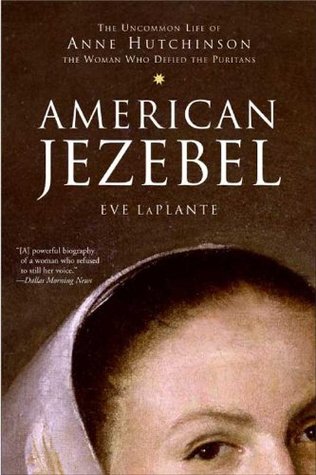More on this book
Community
Kindle Notes & Highlights
by
Eve LaPlante
Read between
August 23 - September 10, 2020
In the midst of this late pregnancy, she was welcoming grandchildren.
Christmas was largely ignored here, except for a church prayer service and sometimes a Fast Day. Puritans considered decorations, gifts, and parties to be pagan idolatry.
a settlement named Quinnipiac, or “long water,”
All the more liberal spirits saw that Massachusetts could henceforth be no home for them, and made haste to other points.”
February 2 was Candlemas (forerunner of Groundhog Day), a religious festival associated with early spring,
These first Rhode Islanders valued religious liberty, a freedom that, in large part because of them, the constitutions of Rhode Island and the United States would later proclaim.
Men of the period tended to view midwifery, a realm of power from which they were excluded, with suspicion.
Let me say this to you all, let not the good you have received from her in your spiritual estates make you to receive all for good that comes from her. For, you see, she is but a woman.”
Her pride and aggressiveness seemed to them the work of Satan rather than “the more human desire for equal opportunity and treatment”
fundamental belief of English Calvinism as stated in the Thirty-Nine Articles of Religion.
Through her, they might frighten others, especially women and the defiant merchant class of men that supported her, into submission.
Anne Hutchinson was not a feminist, in the modern sense, but her gender was a central issue for the men.
A woman of her time, she accepted the gender hierarchies of the seventeenth century.
For a woman in colonial Massachusetts, to conform to the status quo was to be silent and passive. This was not an option for Anne Hutchinson.
an indication of Hutchinson’s great confidence in herself. She had a pioneering sense of her self and her destiny, which is extraordinary in a woman of the seventeenth century, to whom so little authority was allowed.
Hutchinson’s desire to look within for guidance is characteristic of the distinctively American faith in the power of the individual conscience.
Quaker (initially a derogatory term for the bodily shaking of Friends during worship)
In 1644 the General Court ordered that Anabaptists were banished, upon pain of death, and in 1658 it extended this punishment to Quakers.
In 1626 Peter Minuit, New Amsterdam’s first director-general, had purchased the island of Manhattan—“island of the hills”—from local Indians for beads and trinkets worth sixty guilders, or twenty-four dollars.
“Congress shall make no law respecting an establishment of religion, or prohibiting the free exercise thereof.” These words and the underlying concept owe as much to the Hutchinsonians on Aquidneck as to Roger Williams in Providence Plantation—as well as to the 1634 charter of the colony of Maryland, the earliest such document in English North America to allow religious toleration.
“Anyone who has seen foolishness, sentimentality, delusion, and murderous rage disguised as God’s truth knows that there is no easy answer to the problem that the ancients called discernment of spirits.
In the twentieth century her sixth great-grandson Franklin Delano Roosevelt was president of the United States.
President George H. W. Bush was a ninth great-grandson of Anne’s. Bush’s son, George W., who in 2001 assumed the highest office in the most powerful country in the world, is her tenth great-grandson.
They also wished to diminish Sir Henry Vane, who was now the leader of the English Independent party, working with Cromwell against the monarchists.
A year after her death, at the behest of the freemen of Boston and the order of King Charles II, the court reduced the penalties for religious crimes. There were no more executions of Quakers, although whippings of Quakers continued.
In 1987 Michael Dukakis, Winthrop’s political descendant as governor of Massachusetts, formally pardoned Anne Hutchinson.
Each April 26 the town observes Anne Hutchinson Day, inspired by the citizens of Portsmouth, Rhode Island, who began honoring her annually in April 1996.


